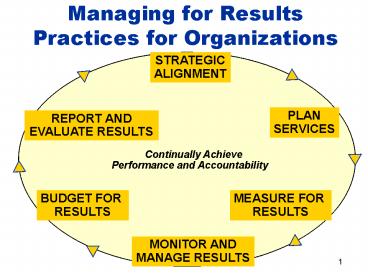Managing for Results Practices for Organizations - PowerPoint PPT Presentation
Title:
Managing for Results Practices for Organizations
Description:
Align services with organizational goals ... Align measurement with the planning process--achieving ... Align budget investments with achieving strategic goals ... – PowerPoint PPT presentation
Number of Views:218
Avg rating:3.0/5.0
Title: Managing for Results Practices for Organizations
1
Managing for Results Practices for Organizations
STRATEGIC ALIGNMENT
PLANSERVICES
REPORT AND EVALUATE RESULTS
Continually Achieve Performance and
Accountability
MEASURE FOR RESULTS
BUDGET FOR RESULTS
MONITOR AND MANAGE RESULTS
1
2
What is Managing for Results?
- A performance management system used to
- Determine the most important results
- Establish and communicate direction
- Manage progress toward meeting goals
- Invest resources strategically
- Use performance information to continually
improve performance and provide accountability
for results
3
Strategic Alignment What Effective
Organizations Do
- Focus on their mission
- Understand their environment
- Develop strategic goals with outcome indicators
- Craft strategies and realistic but challenging
objectives to achieve goals - Align strategic planning with policy setting
- Align systems to support goal achievement
4
Service Planning What Effective Organizations
Do
- Align services with organizational goals
- Practice a planning process that helps managers
and programs be more effective - Engage stakeholders effectively
- Have service (program) level outcomes
- Have clear, well articulated strategies and
performance objectives (service levels) - Align planning with budgeting
5
Measure for Results What Effective
Organizations Do
- Align measurement with the planning
process--achieving desired outcomes - Develop relevant measures that people care about
- Ensure measures are feasible to report
- Use a balanced set of measures
- Clearly communicate the benefit and value of the
organizations work with measures
6
Monitor and Manage What Effective
Organizations Do
- Practice regular, timely data collection
- Incorporate performance into contracts
- Regularly monitor against targets, plans
- Continuously analyze and interpret performance
information - Share and use data constructively for improving
performance
7
Budgeting for Results What Effective
Organizations Do
- Align budget investments with achieving strategic
goals - Link resource requests to specific service levels
and objectives - Incorporate clear performance targets
- Use past and planned performance information to
inform decision-making
8
Evaluation and Reporting What Effective
Organizations Do
- Report actual performance vs. plans and targets
- Provide verification of performance data
- Use regular, reliable systems to track citizen
and customer perceptions - Analyze and explain performance information
clearly - Compare performance with good performers
- Learn from past performance to future
performance and service plans
9
The Benefits of MFR
- Organization-wide focus on achieving visible,
measurable goals and outcomes - Ongoing ability to measure progress
- Ability to develop strategic partnerships
- Align investment decisions with results
- Have a tool for continuous improvement
- Demonstrate success and accountability
10
My Practice Supports Management for Results
- I help organizations become more effective in
all facets of results management - Help you understand opportunities and challenges
facing your organization - Work in collaborative partnership with your staff
- Develop an approach you can sustain
- Use my knowledge and experience to accelerate and
ensure your success































